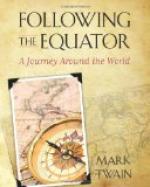“Hello, Mark!”
“Here’s to you, old chap!
“Say—Mark!—is he dead?”—a reference to a passage in some book of mine, though I did not detect, at that time, that that was its source. And I didn’t detect it afterward in Melbourne, when I came on the stage for the first time, and the same question was dropped down upon me from the dizzy height of the gallery. It is always difficult to answer a sudden inquiry like that, when you have come unprepared and don’t know what it means. I will remark here—if it is not an indecorum—that the welcome which an American lecturer gets from a British colonial audience is a thing which will move him to his deepest deeps, and veil his sight and break his voice. And from Winnipeg to Africa, experience will teach him nothing; he will never learn to expect it, it will catch him as a surprise each time. The war-cloud hanging black over England and America made no trouble for me. I was a prospective prisoner of war, but at dinners, suppers, on the platform, and elsewhere, there was never anything to remind me of it. This was hospitality of the right metal, and would have been prominently lacking in some countries, in the circumstances.
And speaking of the war-flurry, it seemed to me to bring to light the unexpected, in a detail or two. It seemed to relegate the war-talk to the politicians on both sides of the water; whereas whenever a prospective war between two nations had been in the air theretofore, the public had done most of the talking and the bitterest. The attitude of the newspapers was new also. I speak of those of Australasia and India, for I had access to those only. They treated the subject argumentatively and with dignity, not with spite and anger. That was a new spirit, too, and not learned of the French and German press, either before Sedan or since. I heard many public speeches, and they reflected the moderation of the journals. The outlook is that the English-speaking race will dominate the earth a hundred years from now, if its sections do not get to fighting each other. It would be a pity to spoil that prospect by baffling and retarding wars when arbitration would settle their differences so much better and also so much more definitely.
No, as I have suggested, novelties are rare in the great capitals of modern times. Even the wool exchange in Melbourne could not be told from the familiar stock exchange of other countries. Wool brokers are just like stockbrokers; they all bounce from their seats and put up their hands and yell in unison—no stranger can tell what—and the president calmly says “Sold to Smith & Co., threpence farthing—next!”—when probably nothing of the kind happened; for how should he know?




